A Study on Gardening, Mental Wellbeing, and Housewives in Malaysia
VerifiedAdded on 2022/09/07
|48
|15188
|42
Report
AI Summary
This report investigates the impact of gardening on the mental wellbeing of housewives, particularly those living in low-cost flats in Malaysia. The study highlights the increasing prevalence of mental health issues among Malaysians, especially women and housewives, and explores the potential of nature-based interventions like gardening to alleviate stress and improve overall mental health. The research examines the experiences of housewives engaged in pot gardening, focusing on the benefits such as stress reduction, enhanced cognitive capabilities, and improved physical health. The report reviews relevant literature, including Attention Restoration Theory and the Psycho-physiological stress reduction theory, and discusses the significance of the study in raising awareness and potentially influencing government policies to incorporate gardening as a tool for mental health promotion among the lower-income population. The report also addresses the lack of research on the topic, especially concerning housewives from lower-income groups and living in low-cost apartments, emphasizing the need for further exploration of how gardening can be a beneficial tool for specific types of housewives and their mental wellbeing.
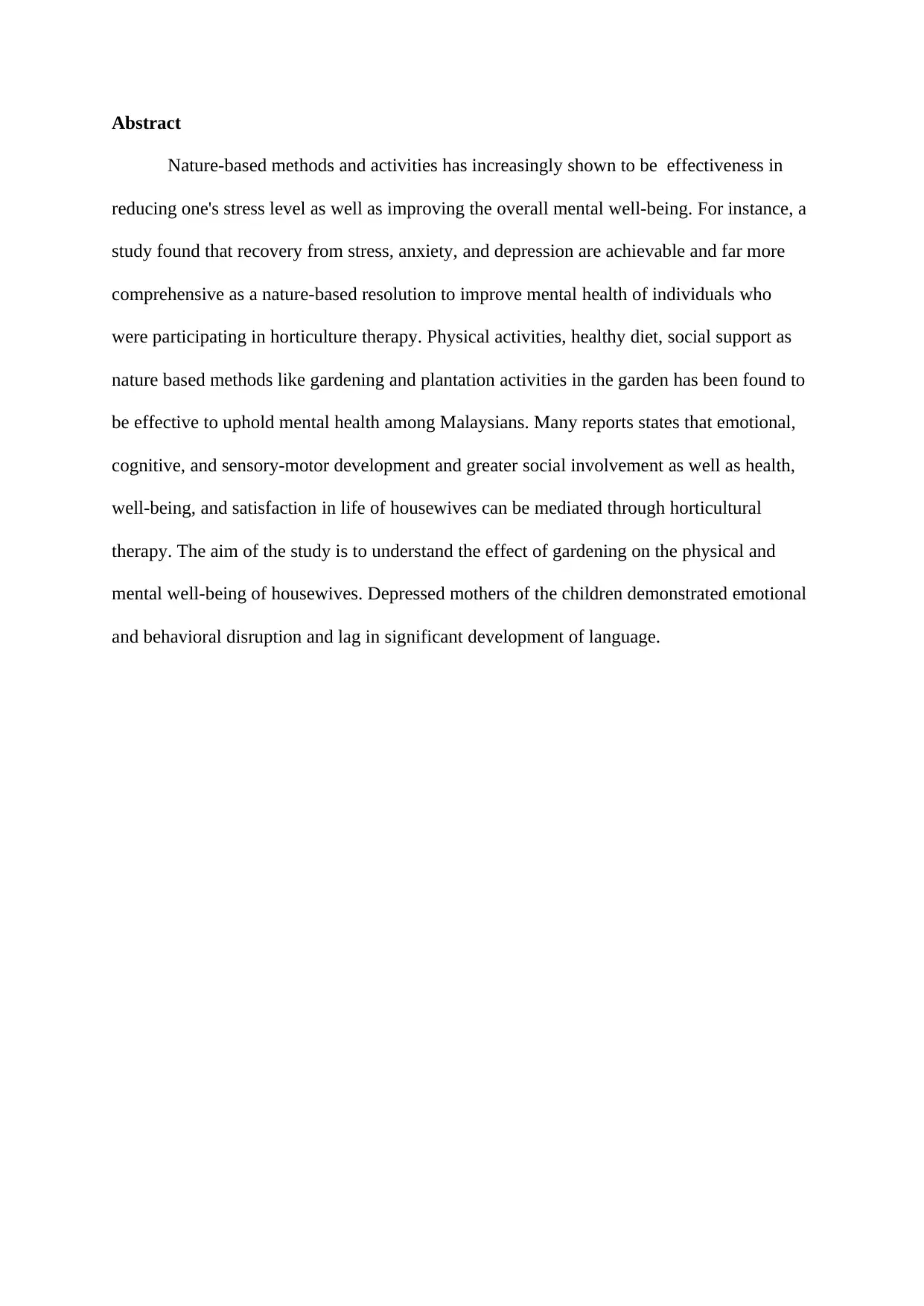
Abstract
Nature-based methods and activities has increasingly shown to be effectiveness in
reducing one's stress level as well as improving the overall mental well-being. For instance, a
study found that recovery from stress, anxiety, and depression are achievable and far more
comprehensive as a nature-based resolution to improve mental health of individuals who
were participating in horticulture therapy. Physical activities, healthy diet, social support as
nature based methods like gardening and plantation activities in the garden has been found to
be effective to uphold mental health among Malaysians. Many reports states that emotional,
cognitive, and sensory-motor development and greater social involvement as well as health,
well-being, and satisfaction in life of housewives can be mediated through horticultural
therapy. The aim of the study is to understand the effect of gardening on the physical and
mental well-being of housewives. Depressed mothers of the children demonstrated emotional
and behavioral disruption and lag in significant development of language.
Nature-based methods and activities has increasingly shown to be effectiveness in
reducing one's stress level as well as improving the overall mental well-being. For instance, a
study found that recovery from stress, anxiety, and depression are achievable and far more
comprehensive as a nature-based resolution to improve mental health of individuals who
were participating in horticulture therapy. Physical activities, healthy diet, social support as
nature based methods like gardening and plantation activities in the garden has been found to
be effective to uphold mental health among Malaysians. Many reports states that emotional,
cognitive, and sensory-motor development and greater social involvement as well as health,
well-being, and satisfaction in life of housewives can be mediated through horticultural
therapy. The aim of the study is to understand the effect of gardening on the physical and
mental well-being of housewives. Depressed mothers of the children demonstrated emotional
and behavioral disruption and lag in significant development of language.
Paraphrase This Document
Need a fresh take? Get an instant paraphrase of this document with our AI Paraphraser
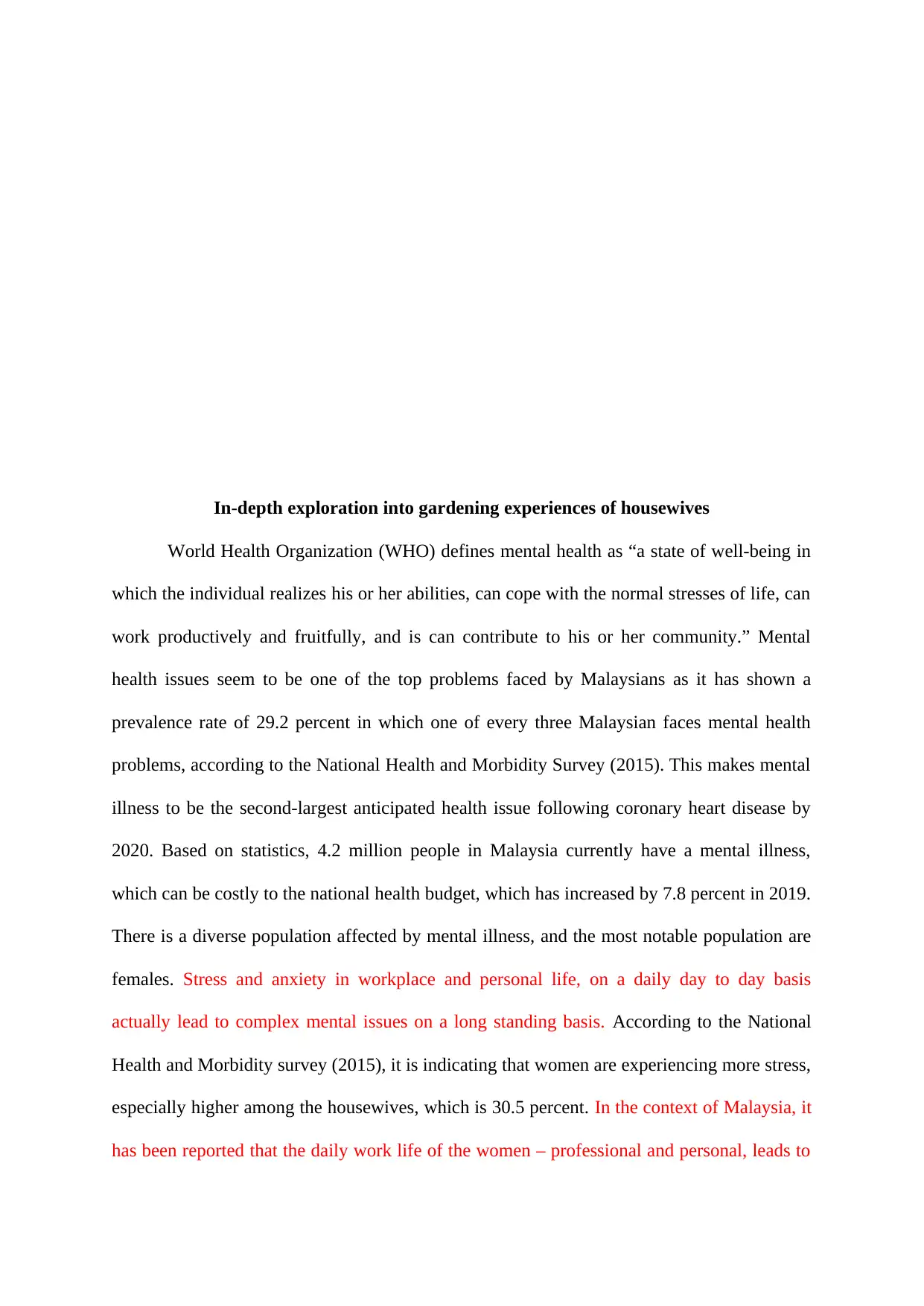
In-depth exploration into gardening experiences of housewives
World Health Organization (WHO) defines mental health as “a state of well-being in
which the individual realizes his or her abilities, can cope with the normal stresses of life, can
work productively and fruitfully, and is can contribute to his or her community.” Mental
health issues seem to be one of the top problems faced by Malaysians as it has shown a
prevalence rate of 29.2 percent in which one of every three Malaysian faces mental health
problems, according to the National Health and Morbidity Survey (2015). This makes mental
illness to be the second-largest anticipated health issue following coronary heart disease by
2020. Based on statistics, 4.2 million people in Malaysia currently have a mental illness,
which can be costly to the national health budget, which has increased by 7.8 percent in 2019.
There is a diverse population affected by mental illness, and the most notable population are
females. Stress and anxiety in workplace and personal life, on a daily day to day basis
actually lead to complex mental issues on a long standing basis. According to the National
Health and Morbidity survey (2015), it is indicating that women are experiencing more stress,
especially higher among the housewives, which is 30.5 percent. In the context of Malaysia, it
has been reported that the daily work life of the women – professional and personal, leads to
World Health Organization (WHO) defines mental health as “a state of well-being in
which the individual realizes his or her abilities, can cope with the normal stresses of life, can
work productively and fruitfully, and is can contribute to his or her community.” Mental
health issues seem to be one of the top problems faced by Malaysians as it has shown a
prevalence rate of 29.2 percent in which one of every three Malaysian faces mental health
problems, according to the National Health and Morbidity Survey (2015). This makes mental
illness to be the second-largest anticipated health issue following coronary heart disease by
2020. Based on statistics, 4.2 million people in Malaysia currently have a mental illness,
which can be costly to the national health budget, which has increased by 7.8 percent in 2019.
There is a diverse population affected by mental illness, and the most notable population are
females. Stress and anxiety in workplace and personal life, on a daily day to day basis
actually lead to complex mental issues on a long standing basis. According to the National
Health and Morbidity survey (2015), it is indicating that women are experiencing more stress,
especially higher among the housewives, which is 30.5 percent. In the context of Malaysia, it
has been reported that the daily work life of the women – professional and personal, leads to
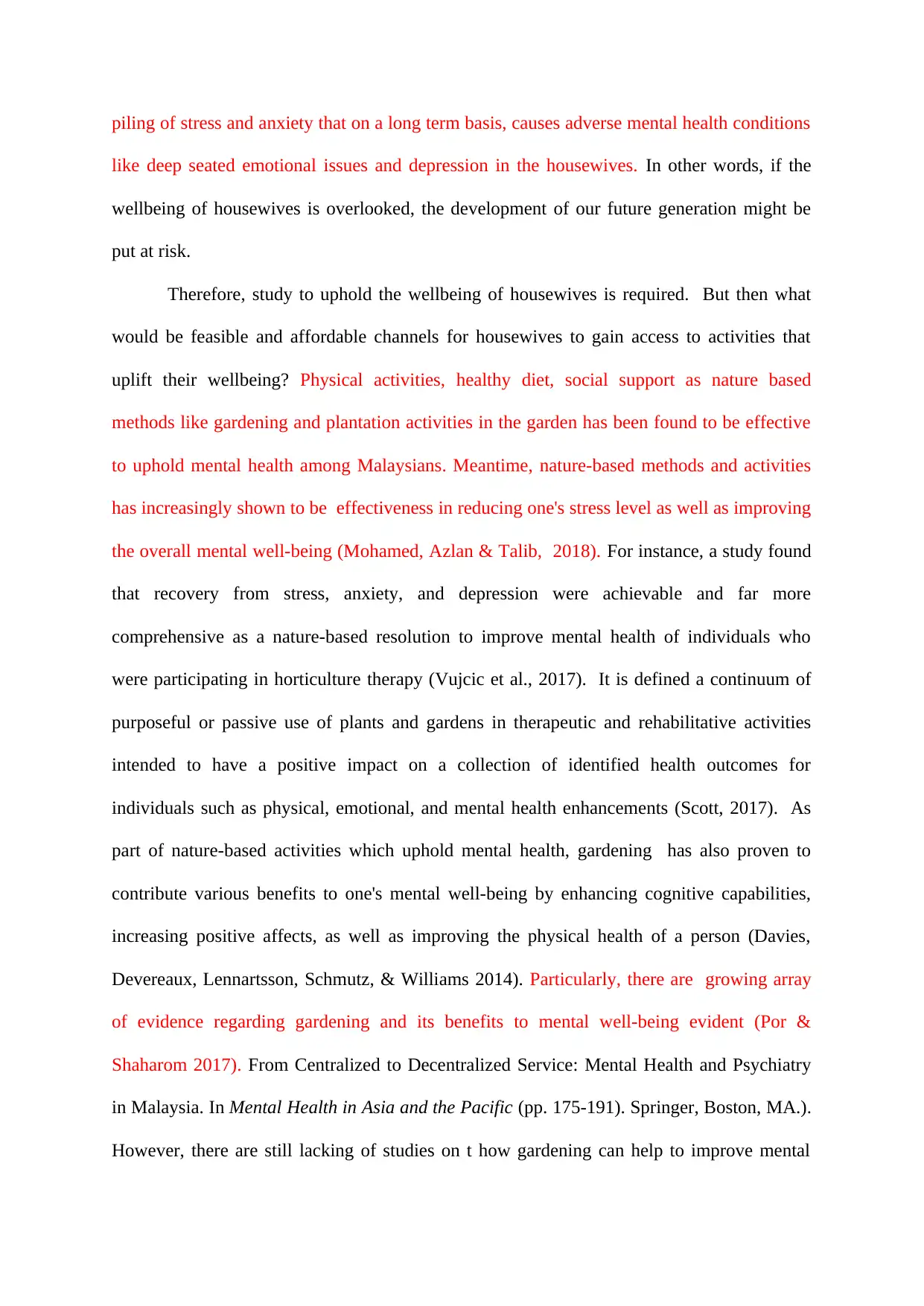
piling of stress and anxiety that on a long term basis, causes adverse mental health conditions
like deep seated emotional issues and depression in the housewives. In other words, if the
wellbeing of housewives is overlooked, the development of our future generation might be
put at risk.
Therefore, study to uphold the wellbeing of housewives is required. But then what
would be feasible and affordable channels for housewives to gain access to activities that
uplift their wellbeing? Physical activities, healthy diet, social support as nature based
methods like gardening and plantation activities in the garden has been found to be effective
to uphold mental health among Malaysians. Meantime, nature-based methods and activities
has increasingly shown to be effectiveness in reducing one's stress level as well as improving
the overall mental well-being (Mohamed, Azlan & Talib, 2018). For instance, a study found
that recovery from stress, anxiety, and depression were achievable and far more
comprehensive as a nature-based resolution to improve mental health of individuals who
were participating in horticulture therapy (Vujcic et al., 2017). It is defined a continuum of
purposeful or passive use of plants and gardens in therapeutic and rehabilitative activities
intended to have a positive impact on a collection of identified health outcomes for
individuals such as physical, emotional, and mental health enhancements (Scott, 2017). As
part of nature-based activities which uphold mental health, gardening has also proven to
contribute various benefits to one's mental well-being by enhancing cognitive capabilities,
increasing positive affects, as well as improving the physical health of a person (Davies,
Devereaux, Lennartsson, Schmutz, & Williams 2014). Particularly, there are growing array
of evidence regarding gardening and its benefits to mental well-being evident (Por &
Shaharom 2017). From Centralized to Decentralized Service: Mental Health and Psychiatry
in Malaysia. In Mental Health in Asia and the Pacific (pp. 175-191). Springer, Boston, MA.).
However, there are still lacking of studies on t how gardening can help to improve mental
like deep seated emotional issues and depression in the housewives. In other words, if the
wellbeing of housewives is overlooked, the development of our future generation might be
put at risk.
Therefore, study to uphold the wellbeing of housewives is required. But then what
would be feasible and affordable channels for housewives to gain access to activities that
uplift their wellbeing? Physical activities, healthy diet, social support as nature based
methods like gardening and plantation activities in the garden has been found to be effective
to uphold mental health among Malaysians. Meantime, nature-based methods and activities
has increasingly shown to be effectiveness in reducing one's stress level as well as improving
the overall mental well-being (Mohamed, Azlan & Talib, 2018). For instance, a study found
that recovery from stress, anxiety, and depression were achievable and far more
comprehensive as a nature-based resolution to improve mental health of individuals who
were participating in horticulture therapy (Vujcic et al., 2017). It is defined a continuum of
purposeful or passive use of plants and gardens in therapeutic and rehabilitative activities
intended to have a positive impact on a collection of identified health outcomes for
individuals such as physical, emotional, and mental health enhancements (Scott, 2017). As
part of nature-based activities which uphold mental health, gardening has also proven to
contribute various benefits to one's mental well-being by enhancing cognitive capabilities,
increasing positive affects, as well as improving the physical health of a person (Davies,
Devereaux, Lennartsson, Schmutz, & Williams 2014). Particularly, there are growing array
of evidence regarding gardening and its benefits to mental well-being evident (Por &
Shaharom 2017). From Centralized to Decentralized Service: Mental Health and Psychiatry
in Malaysia. In Mental Health in Asia and the Pacific (pp. 175-191). Springer, Boston, MA.).
However, there are still lacking of studies on t how gardening can help to improve mental
⊘ This is a preview!⊘
Do you want full access?
Subscribe today to unlock all pages.

Trusted by 1+ million students worldwide
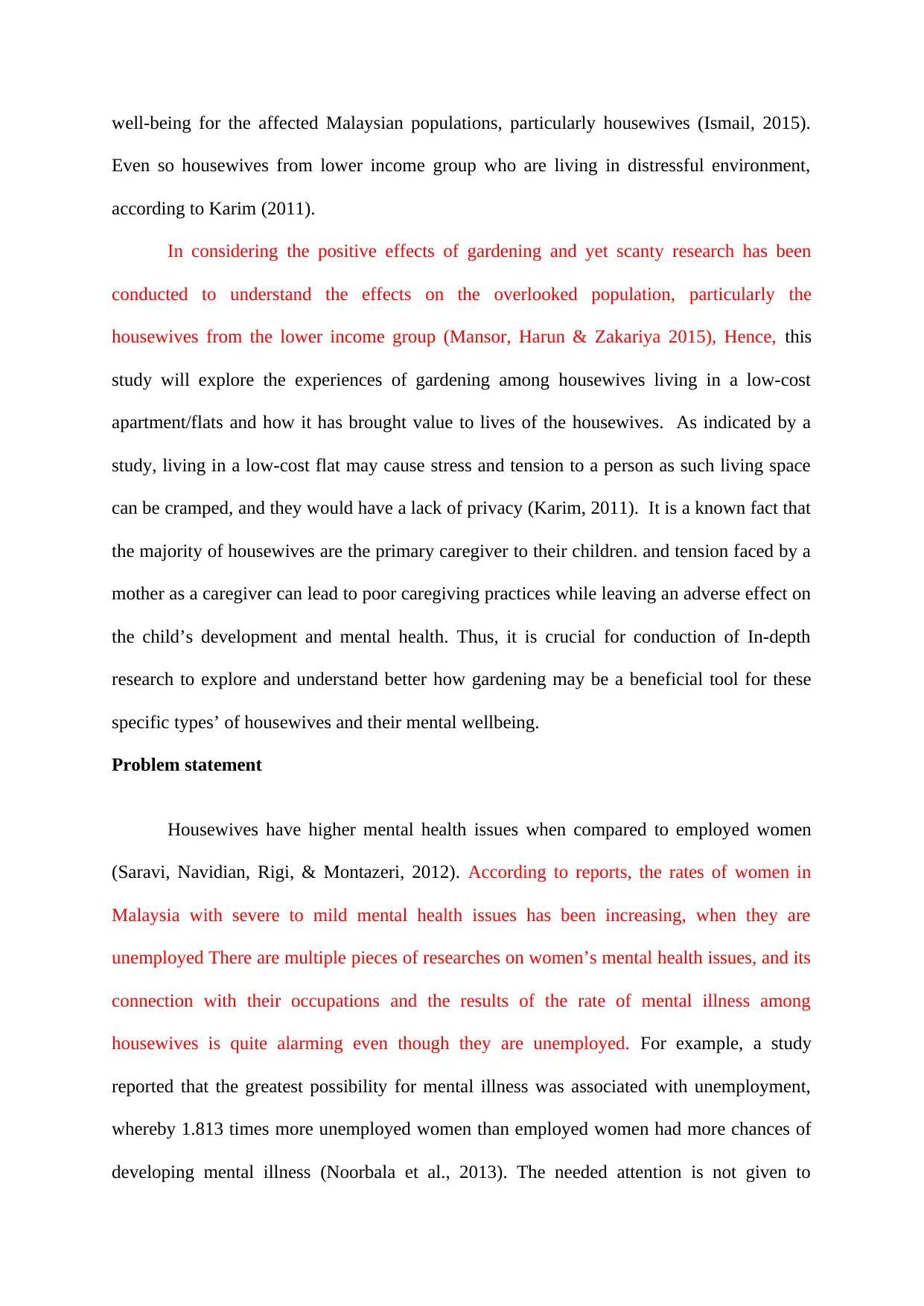
well-being for the affected Malaysian populations, particularly housewives (Ismail, 2015).
Even so housewives from lower income group who are living in distressful environment,
according to Karim (2011).
In considering the positive effects of gardening and yet scanty research has been
conducted to understand the effects on the overlooked population, particularly the
housewives from the lower income group (Mansor, Harun & Zakariya 2015), Hence, this
study will explore the experiences of gardening among housewives living in a low-cost
apartment/flats and how it has brought value to lives of the housewives. As indicated by a
study, living in a low-cost flat may cause stress and tension to a person as such living space
can be cramped, and they would have a lack of privacy (Karim, 2011). It is a known fact that
the majority of housewives are the primary caregiver to their children. and tension faced by a
mother as a caregiver can lead to poor caregiving practices while leaving an adverse effect on
the child’s development and mental health. Thus, it is crucial for conduction of In-depth
research to explore and understand better how gardening may be a beneficial tool for these
specific types’ of housewives and their mental wellbeing.
Problem statement
Housewives have higher mental health issues when compared to employed women
(Saravi, Navidian, Rigi, & Montazeri, 2012). According to reports, the rates of women in
Malaysia with severe to mild mental health issues has been increasing, when they are
unemployed There are multiple pieces of researches on women’s mental health issues, and its
connection with their occupations and the results of the rate of mental illness among
housewives is quite alarming even though they are unemployed. For example, a study
reported that the greatest possibility for mental illness was associated with unemployment,
whereby 1.813 times more unemployed women than employed women had more chances of
developing mental illness (Noorbala et al., 2013). The needed attention is not given to
Even so housewives from lower income group who are living in distressful environment,
according to Karim (2011).
In considering the positive effects of gardening and yet scanty research has been
conducted to understand the effects on the overlooked population, particularly the
housewives from the lower income group (Mansor, Harun & Zakariya 2015), Hence, this
study will explore the experiences of gardening among housewives living in a low-cost
apartment/flats and how it has brought value to lives of the housewives. As indicated by a
study, living in a low-cost flat may cause stress and tension to a person as such living space
can be cramped, and they would have a lack of privacy (Karim, 2011). It is a known fact that
the majority of housewives are the primary caregiver to their children. and tension faced by a
mother as a caregiver can lead to poor caregiving practices while leaving an adverse effect on
the child’s development and mental health. Thus, it is crucial for conduction of In-depth
research to explore and understand better how gardening may be a beneficial tool for these
specific types’ of housewives and their mental wellbeing.
Problem statement
Housewives have higher mental health issues when compared to employed women
(Saravi, Navidian, Rigi, & Montazeri, 2012). According to reports, the rates of women in
Malaysia with severe to mild mental health issues has been increasing, when they are
unemployed There are multiple pieces of researches on women’s mental health issues, and its
connection with their occupations and the results of the rate of mental illness among
housewives is quite alarming even though they are unemployed. For example, a study
reported that the greatest possibility for mental illness was associated with unemployment,
whereby 1.813 times more unemployed women than employed women had more chances of
developing mental illness (Noorbala et al., 2013). The needed attention is not given to
Paraphrase This Document
Need a fresh take? Get an instant paraphrase of this document with our AI Paraphraser
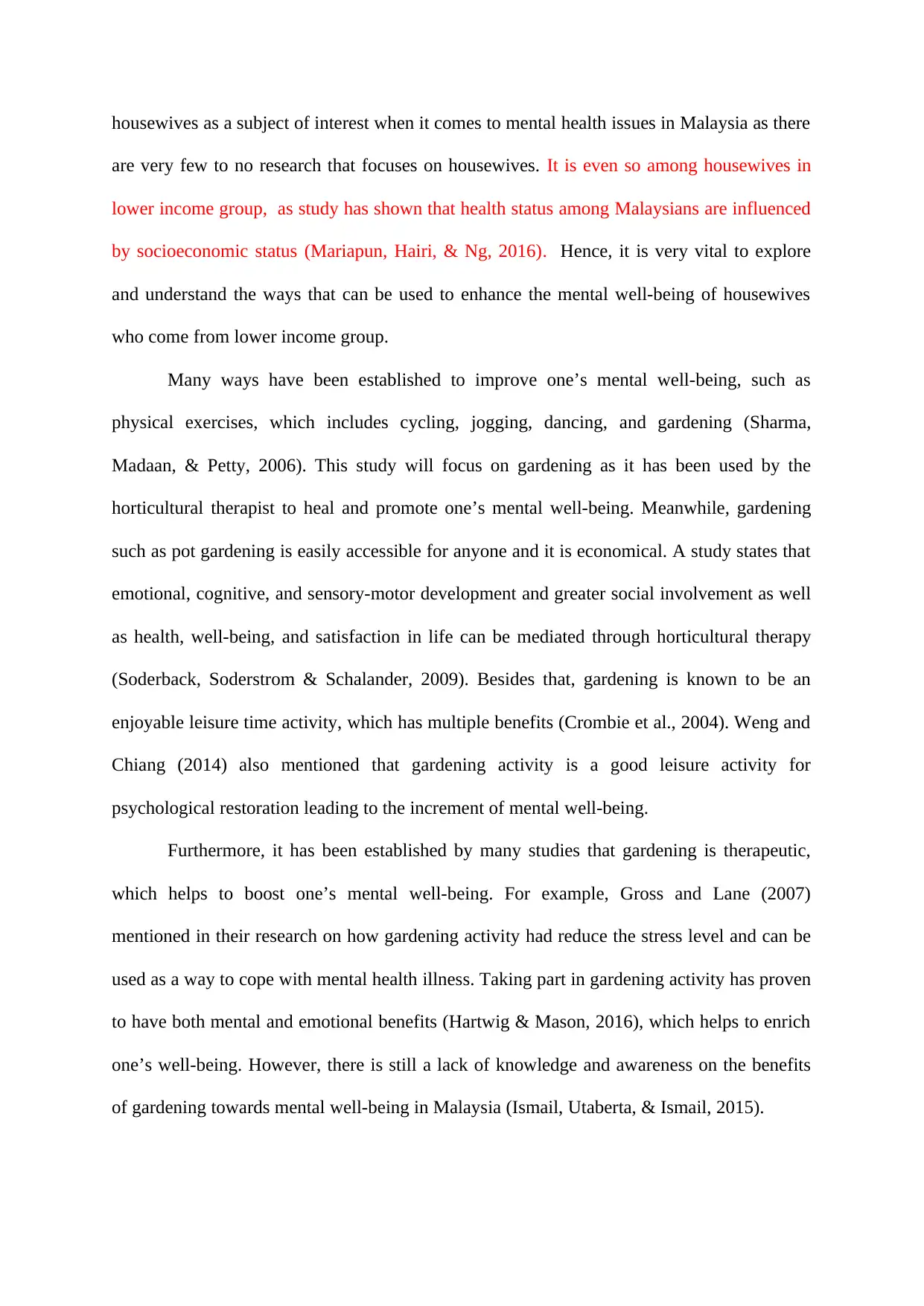
housewives as a subject of interest when it comes to mental health issues in Malaysia as there
are very few to no research that focuses on housewives. It is even so among housewives in
lower income group, as study has shown that health status among Malaysians are influenced
by socioeconomic status (Mariapun, Hairi, & Ng, 2016). Hence, it is very vital to explore
and understand the ways that can be used to enhance the mental well-being of housewives
who come from lower income group.
Many ways have been established to improve one’s mental well-being, such as
physical exercises, which includes cycling, jogging, dancing, and gardening (Sharma,
Madaan, & Petty, 2006). This study will focus on gardening as it has been used by the
horticultural therapist to heal and promote one’s mental well-being. Meanwhile, gardening
such as pot gardening is easily accessible for anyone and it is economical. A study states that
emotional, cognitive, and sensory-motor development and greater social involvement as well
as health, well-being, and satisfaction in life can be mediated through horticultural therapy
(Soderback, Soderstrom & Schalander, 2009). Besides that, gardening is known to be an
enjoyable leisure time activity, which has multiple benefits (Crombie et al., 2004). Weng and
Chiang (2014) also mentioned that gardening activity is a good leisure activity for
psychological restoration leading to the increment of mental well-being.
Furthermore, it has been established by many studies that gardening is therapeutic,
which helps to boost one’s mental well-being. For example, Gross and Lane (2007)
mentioned in their research on how gardening activity had reduce the stress level and can be
used as a way to cope with mental health illness. Taking part in gardening activity has proven
to have both mental and emotional benefits (Hartwig & Mason, 2016), which helps to enrich
one’s well-being. However, there is still a lack of knowledge and awareness on the benefits
of gardening towards mental well-being in Malaysia (Ismail, Utaberta, & Ismail, 2015).
are very few to no research that focuses on housewives. It is even so among housewives in
lower income group, as study has shown that health status among Malaysians are influenced
by socioeconomic status (Mariapun, Hairi, & Ng, 2016). Hence, it is very vital to explore
and understand the ways that can be used to enhance the mental well-being of housewives
who come from lower income group.
Many ways have been established to improve one’s mental well-being, such as
physical exercises, which includes cycling, jogging, dancing, and gardening (Sharma,
Madaan, & Petty, 2006). This study will focus on gardening as it has been used by the
horticultural therapist to heal and promote one’s mental well-being. Meanwhile, gardening
such as pot gardening is easily accessible for anyone and it is economical. A study states that
emotional, cognitive, and sensory-motor development and greater social involvement as well
as health, well-being, and satisfaction in life can be mediated through horticultural therapy
(Soderback, Soderstrom & Schalander, 2009). Besides that, gardening is known to be an
enjoyable leisure time activity, which has multiple benefits (Crombie et al., 2004). Weng and
Chiang (2014) also mentioned that gardening activity is a good leisure activity for
psychological restoration leading to the increment of mental well-being.
Furthermore, it has been established by many studies that gardening is therapeutic,
which helps to boost one’s mental well-being. For example, Gross and Lane (2007)
mentioned in their research on how gardening activity had reduce the stress level and can be
used as a way to cope with mental health illness. Taking part in gardening activity has proven
to have both mental and emotional benefits (Hartwig & Mason, 2016), which helps to enrich
one’s well-being. However, there is still a lack of knowledge and awareness on the benefits
of gardening towards mental well-being in Malaysia (Ismail, Utaberta, & Ismail, 2015).
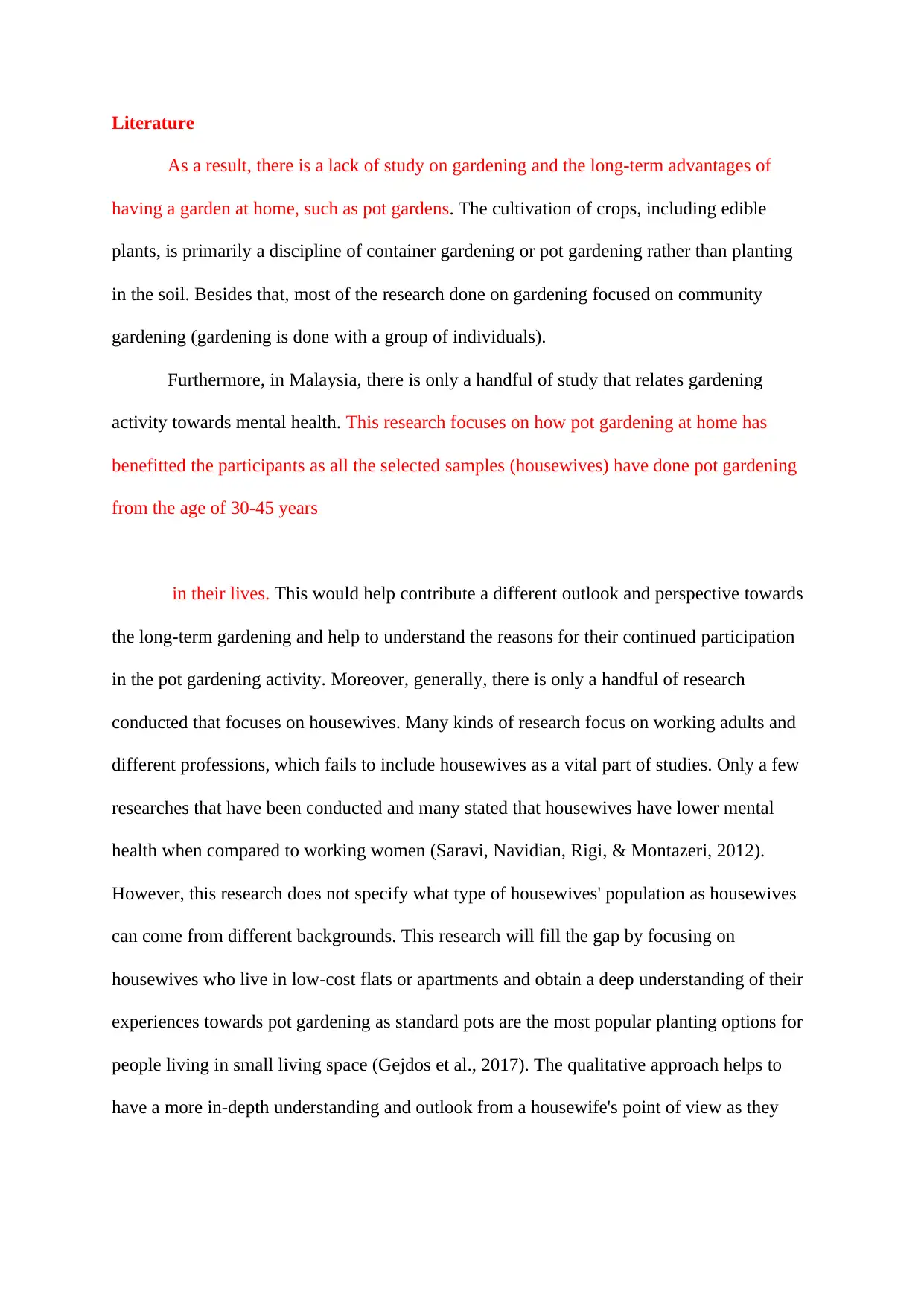
Literature
As a result, there is a lack of study on gardening and the long-term advantages of
having a garden at home, such as pot gardens. The cultivation of crops, including edible
plants, is primarily a discipline of container gardening or pot gardening rather than planting
in the soil. Besides that, most of the research done on gardening focused on community
gardening (gardening is done with a group of individuals).
Furthermore, in Malaysia, there is only a handful of study that relates gardening
activity towards mental health. This research focuses on how pot gardening at home has
benefitted the participants as all the selected samples (housewives) have done pot gardening
from the age of 30-45 years
in their lives. This would help contribute a different outlook and perspective towards
the long-term gardening and help to understand the reasons for their continued participation
in the pot gardening activity. Moreover, generally, there is only a handful of research
conducted that focuses on housewives. Many kinds of research focus on working adults and
different professions, which fails to include housewives as a vital part of studies. Only a few
researches that have been conducted and many stated that housewives have lower mental
health when compared to working women (Saravi, Navidian, Rigi, & Montazeri, 2012).
However, this research does not specify what type of housewives' population as housewives
can come from different backgrounds. This research will fill the gap by focusing on
housewives who live in low-cost flats or apartments and obtain a deep understanding of their
experiences towards pot gardening as standard pots are the most popular planting options for
people living in small living space (Gejdos et al., 2017). The qualitative approach helps to
have a more in-depth understanding and outlook from a housewife's point of view as they
As a result, there is a lack of study on gardening and the long-term advantages of
having a garden at home, such as pot gardens. The cultivation of crops, including edible
plants, is primarily a discipline of container gardening or pot gardening rather than planting
in the soil. Besides that, most of the research done on gardening focused on community
gardening (gardening is done with a group of individuals).
Furthermore, in Malaysia, there is only a handful of study that relates gardening
activity towards mental health. This research focuses on how pot gardening at home has
benefitted the participants as all the selected samples (housewives) have done pot gardening
from the age of 30-45 years
in their lives. This would help contribute a different outlook and perspective towards
the long-term gardening and help to understand the reasons for their continued participation
in the pot gardening activity. Moreover, generally, there is only a handful of research
conducted that focuses on housewives. Many kinds of research focus on working adults and
different professions, which fails to include housewives as a vital part of studies. Only a few
researches that have been conducted and many stated that housewives have lower mental
health when compared to working women (Saravi, Navidian, Rigi, & Montazeri, 2012).
However, this research does not specify what type of housewives' population as housewives
can come from different backgrounds. This research will fill the gap by focusing on
housewives who live in low-cost flats or apartments and obtain a deep understanding of their
experiences towards pot gardening as standard pots are the most popular planting options for
people living in small living space (Gejdos et al., 2017). The qualitative approach helps to
have a more in-depth understanding and outlook from a housewife's point of view as they
⊘ This is a preview!⊘
Do you want full access?
Subscribe today to unlock all pages.

Trusted by 1+ million students worldwide
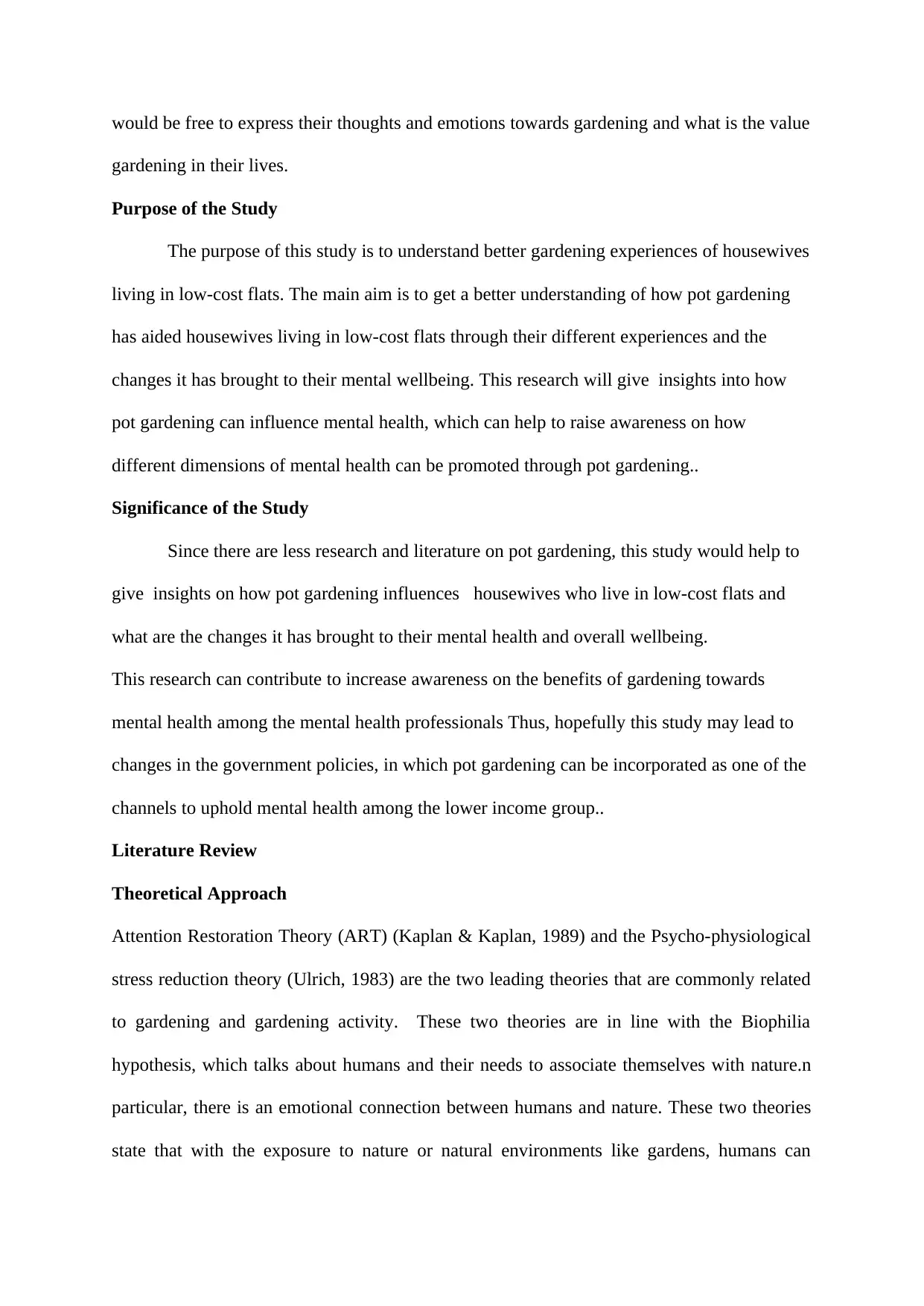
would be free to express their thoughts and emotions towards gardening and what is the value
gardening in their lives.
Purpose of the Study
The purpose of this study is to understand better gardening experiences of housewives
living in low-cost flats. The main aim is to get a better understanding of how pot gardening
has aided housewives living in low-cost flats through their different experiences and the
changes it has brought to their mental wellbeing. This research will give insights into how
pot gardening can influence mental health, which can help to raise awareness on how
different dimensions of mental health can be promoted through pot gardening..
Significance of the Study
Since there are less research and literature on pot gardening, this study would help to
give insights on how pot gardening influences housewives who live in low-cost flats and
what are the changes it has brought to their mental health and overall wellbeing.
This research can contribute to increase awareness on the benefits of gardening towards
mental health among the mental health professionals Thus, hopefully this study may lead to
changes in the government policies, in which pot gardening can be incorporated as one of the
channels to uphold mental health among the lower income group..
Literature Review
Theoretical Approach
Attention Restoration Theory (ART) (Kaplan & Kaplan, 1989) and the Psycho-physiological
stress reduction theory (Ulrich, 1983) are the two leading theories that are commonly related
to gardening and gardening activity. These two theories are in line with the Biophilia
hypothesis, which talks about humans and their needs to associate themselves with nature.n
particular, there is an emotional connection between humans and nature. These two theories
state that with the exposure to nature or natural environments like gardens, humans can
gardening in their lives.
Purpose of the Study
The purpose of this study is to understand better gardening experiences of housewives
living in low-cost flats. The main aim is to get a better understanding of how pot gardening
has aided housewives living in low-cost flats through their different experiences and the
changes it has brought to their mental wellbeing. This research will give insights into how
pot gardening can influence mental health, which can help to raise awareness on how
different dimensions of mental health can be promoted through pot gardening..
Significance of the Study
Since there are less research and literature on pot gardening, this study would help to
give insights on how pot gardening influences housewives who live in low-cost flats and
what are the changes it has brought to their mental health and overall wellbeing.
This research can contribute to increase awareness on the benefits of gardening towards
mental health among the mental health professionals Thus, hopefully this study may lead to
changes in the government policies, in which pot gardening can be incorporated as one of the
channels to uphold mental health among the lower income group..
Literature Review
Theoretical Approach
Attention Restoration Theory (ART) (Kaplan & Kaplan, 1989) and the Psycho-physiological
stress reduction theory (Ulrich, 1983) are the two leading theories that are commonly related
to gardening and gardening activity. These two theories are in line with the Biophilia
hypothesis, which talks about humans and their needs to associate themselves with nature.n
particular, there is an emotional connection between humans and nature. These two theories
state that with the exposure to nature or natural environments like gardens, humans can
Paraphrase This Document
Need a fresh take? Get an instant paraphrase of this document with our AI Paraphraser
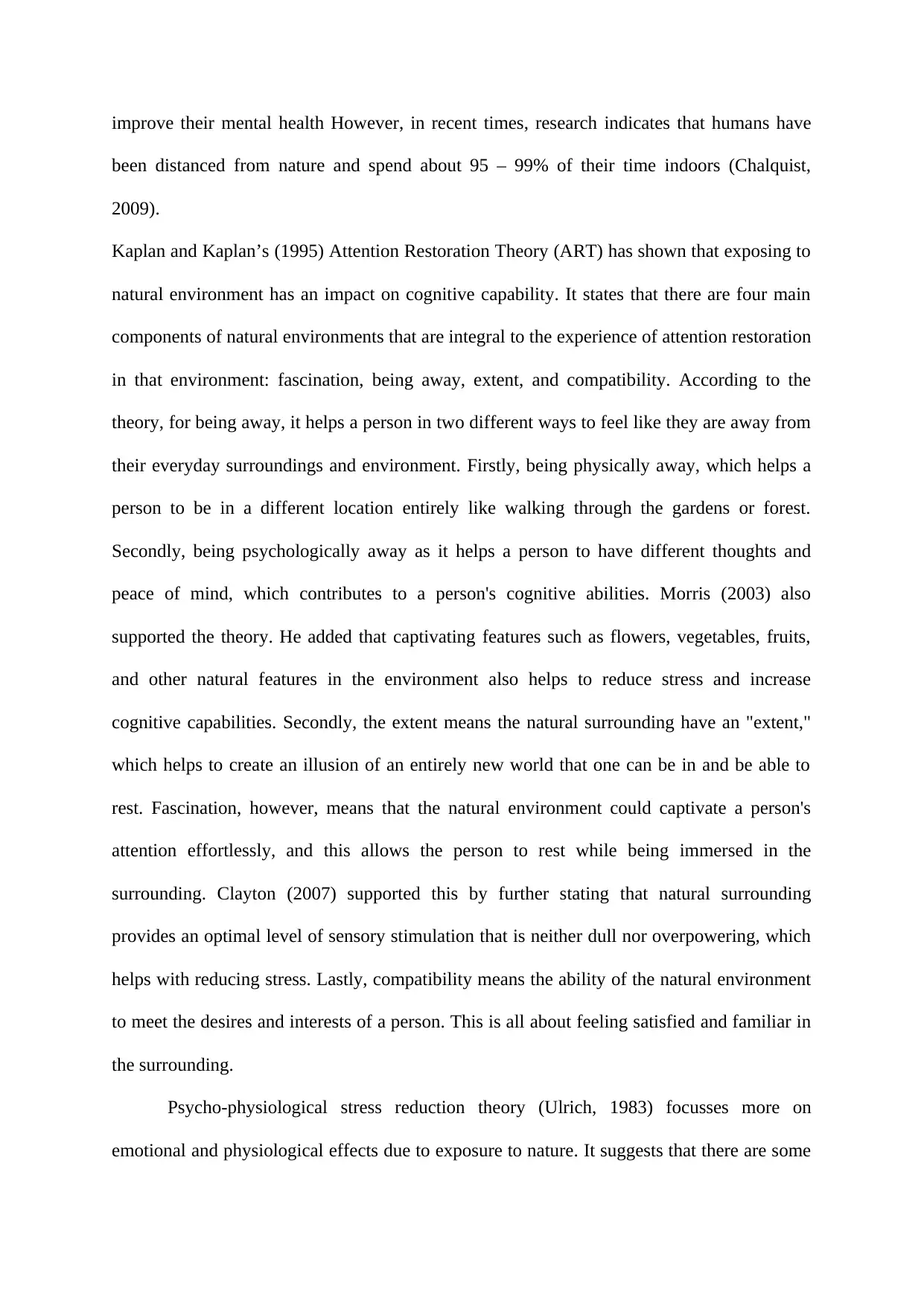
improve their mental health However, in recent times, research indicates that humans have
been distanced from nature and spend about 95 – 99% of their time indoors (Chalquist,
2009).
Kaplan and Kaplan’s (1995) Attention Restoration Theory (ART) has shown that exposing to
natural environment has an impact on cognitive capability. It states that there are four main
components of natural environments that are integral to the experience of attention restoration
in that environment: fascination, being away, extent, and compatibility. According to the
theory, for being away, it helps a person in two different ways to feel like they are away from
their everyday surroundings and environment. Firstly, being physically away, which helps a
person to be in a different location entirely like walking through the gardens or forest.
Secondly, being psychologically away as it helps a person to have different thoughts and
peace of mind, which contributes to a person's cognitive abilities. Morris (2003) also
supported the theory. He added that captivating features such as flowers, vegetables, fruits,
and other natural features in the environment also helps to reduce stress and increase
cognitive capabilities. Secondly, the extent means the natural surrounding have an "extent,"
which helps to create an illusion of an entirely new world that one can be in and be able to
rest. Fascination, however, means that the natural environment could captivate a person's
attention effortlessly, and this allows the person to rest while being immersed in the
surrounding. Clayton (2007) supported this by further stating that natural surrounding
provides an optimal level of sensory stimulation that is neither dull nor overpowering, which
helps with reducing stress. Lastly, compatibility means the ability of the natural environment
to meet the desires and interests of a person. This is all about feeling satisfied and familiar in
the surrounding.
Psycho-physiological stress reduction theory (Ulrich, 1983) focusses more on
emotional and physiological effects due to exposure to nature. It suggests that there are some
been distanced from nature and spend about 95 – 99% of their time indoors (Chalquist,
2009).
Kaplan and Kaplan’s (1995) Attention Restoration Theory (ART) has shown that exposing to
natural environment has an impact on cognitive capability. It states that there are four main
components of natural environments that are integral to the experience of attention restoration
in that environment: fascination, being away, extent, and compatibility. According to the
theory, for being away, it helps a person in two different ways to feel like they are away from
their everyday surroundings and environment. Firstly, being physically away, which helps a
person to be in a different location entirely like walking through the gardens or forest.
Secondly, being psychologically away as it helps a person to have different thoughts and
peace of mind, which contributes to a person's cognitive abilities. Morris (2003) also
supported the theory. He added that captivating features such as flowers, vegetables, fruits,
and other natural features in the environment also helps to reduce stress and increase
cognitive capabilities. Secondly, the extent means the natural surrounding have an "extent,"
which helps to create an illusion of an entirely new world that one can be in and be able to
rest. Fascination, however, means that the natural environment could captivate a person's
attention effortlessly, and this allows the person to rest while being immersed in the
surrounding. Clayton (2007) supported this by further stating that natural surrounding
provides an optimal level of sensory stimulation that is neither dull nor overpowering, which
helps with reducing stress. Lastly, compatibility means the ability of the natural environment
to meet the desires and interests of a person. This is all about feeling satisfied and familiar in
the surrounding.
Psycho-physiological stress reduction theory (Ulrich, 1983) focusses more on
emotional and physiological effects due to exposure to nature. It suggests that there are some
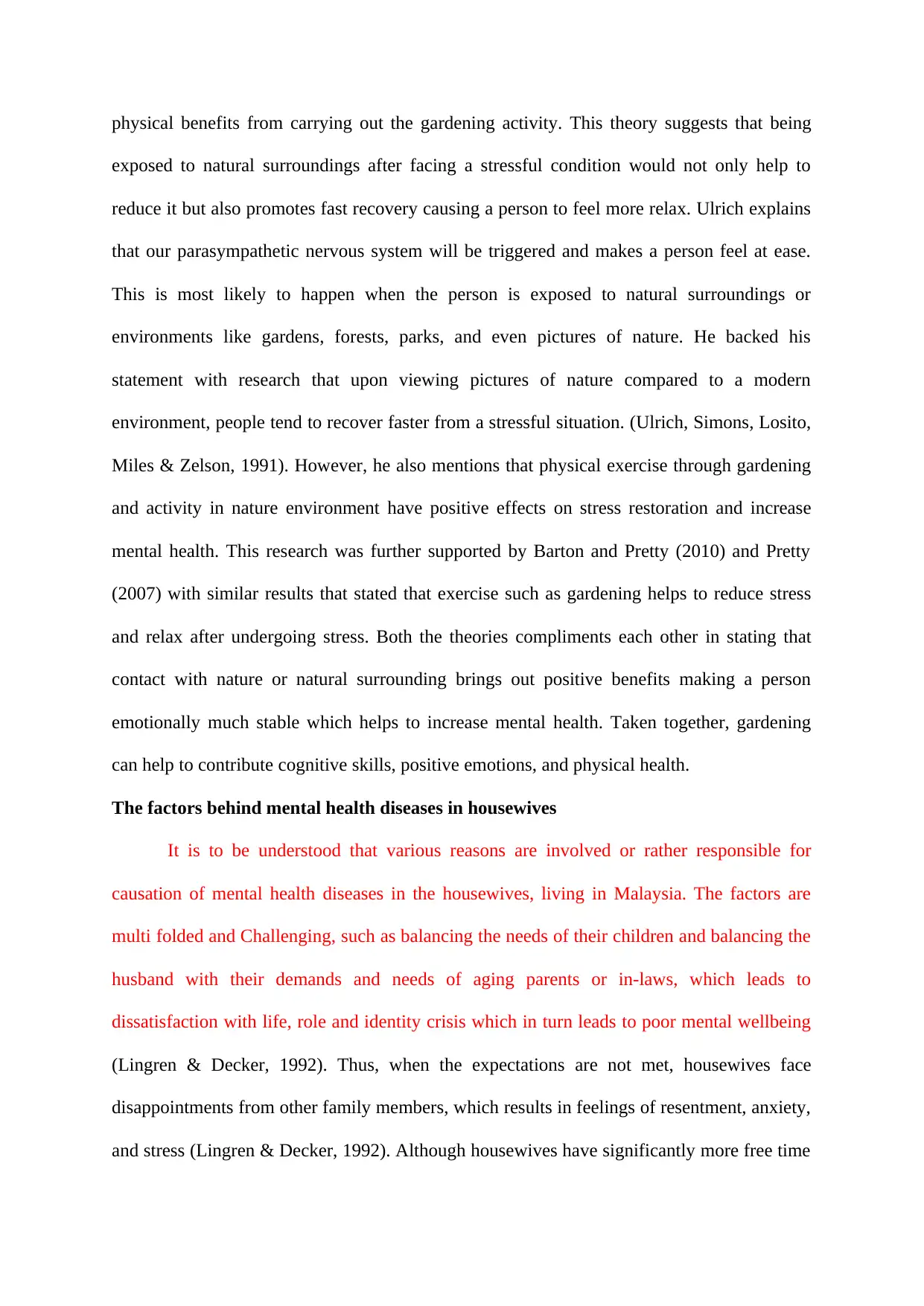
physical benefits from carrying out the gardening activity. This theory suggests that being
exposed to natural surroundings after facing a stressful condition would not only help to
reduce it but also promotes fast recovery causing a person to feel more relax. Ulrich explains
that our parasympathetic nervous system will be triggered and makes a person feel at ease.
This is most likely to happen when the person is exposed to natural surroundings or
environments like gardens, forests, parks, and even pictures of nature. He backed his
statement with research that upon viewing pictures of nature compared to a modern
environment, people tend to recover faster from a stressful situation. (Ulrich, Simons, Losito,
Miles & Zelson, 1991). However, he also mentions that physical exercise through gardening
and activity in nature environment have positive effects on stress restoration and increase
mental health. This research was further supported by Barton and Pretty (2010) and Pretty
(2007) with similar results that stated that exercise such as gardening helps to reduce stress
and relax after undergoing stress. Both the theories compliments each other in stating that
contact with nature or natural surrounding brings out positive benefits making a person
emotionally much stable which helps to increase mental health. Taken together, gardening
can help to contribute cognitive skills, positive emotions, and physical health.
The factors behind mental health diseases in housewives
It is to be understood that various reasons are involved or rather responsible for
causation of mental health diseases in the housewives, living in Malaysia. The factors are
multi folded and Challenging, such as balancing the needs of their children and balancing the
husband with their demands and needs of aging parents or in-laws, which leads to
dissatisfaction with life, role and identity crisis which in turn leads to poor mental wellbeing
(Lingren & Decker, 1992). Thus, when the expectations are not met, housewives face
disappointments from other family members, which results in feelings of resentment, anxiety,
and stress (Lingren & Decker, 1992). Although housewives have significantly more free time
exposed to natural surroundings after facing a stressful condition would not only help to
reduce it but also promotes fast recovery causing a person to feel more relax. Ulrich explains
that our parasympathetic nervous system will be triggered and makes a person feel at ease.
This is most likely to happen when the person is exposed to natural surroundings or
environments like gardens, forests, parks, and even pictures of nature. He backed his
statement with research that upon viewing pictures of nature compared to a modern
environment, people tend to recover faster from a stressful situation. (Ulrich, Simons, Losito,
Miles & Zelson, 1991). However, he also mentions that physical exercise through gardening
and activity in nature environment have positive effects on stress restoration and increase
mental health. This research was further supported by Barton and Pretty (2010) and Pretty
(2007) with similar results that stated that exercise such as gardening helps to reduce stress
and relax after undergoing stress. Both the theories compliments each other in stating that
contact with nature or natural surrounding brings out positive benefits making a person
emotionally much stable which helps to increase mental health. Taken together, gardening
can help to contribute cognitive skills, positive emotions, and physical health.
The factors behind mental health diseases in housewives
It is to be understood that various reasons are involved or rather responsible for
causation of mental health diseases in the housewives, living in Malaysia. The factors are
multi folded and Challenging, such as balancing the needs of their children and balancing the
husband with their demands and needs of aging parents or in-laws, which leads to
dissatisfaction with life, role and identity crisis which in turn leads to poor mental wellbeing
(Lingren & Decker, 1992). Thus, when the expectations are not met, housewives face
disappointments from other family members, which results in feelings of resentment, anxiety,
and stress (Lingren & Decker, 1992). Although housewives have significantly more free time
⊘ This is a preview!⊘
Do you want full access?
Subscribe today to unlock all pages.

Trusted by 1+ million students worldwide
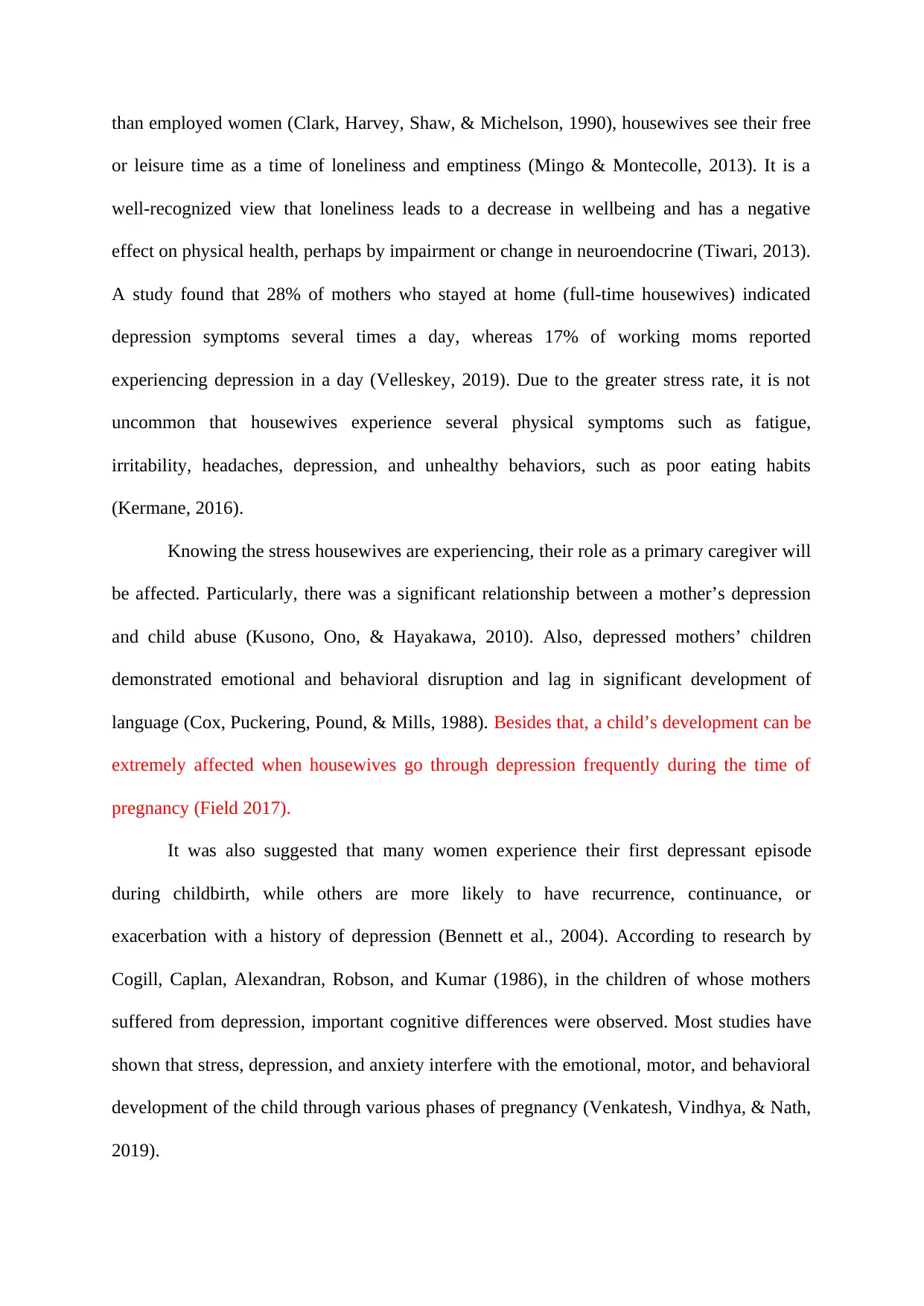
than employed women (Clark, Harvey, Shaw, & Michelson, 1990), housewives see their free
or leisure time as a time of loneliness and emptiness (Mingo & Montecolle, 2013). It is a
well-recognized view that loneliness leads to a decrease in wellbeing and has a negative
effect on physical health, perhaps by impairment or change in neuroendocrine (Tiwari, 2013).
A study found that 28% of mothers who stayed at home (full-time housewives) indicated
depression symptoms several times a day, whereas 17% of working moms reported
experiencing depression in a day (Velleskey, 2019). Due to the greater stress rate, it is not
uncommon that housewives experience several physical symptoms such as fatigue,
irritability, headaches, depression, and unhealthy behaviors, such as poor eating habits
(Kermane, 2016).
Knowing the stress housewives are experiencing, their role as a primary caregiver will
be affected. Particularly, there was a significant relationship between a mother’s depression
and child abuse (Kusono, Ono, & Hayakawa, 2010). Also, depressed mothers’ children
demonstrated emotional and behavioral disruption and lag in significant development of
language (Cox, Puckering, Pound, & Mills, 1988). Besides that, a child’s development can be
extremely affected when housewives go through depression frequently during the time of
pregnancy (Field 2017).
It was also suggested that many women experience their first depressant episode
during childbirth, while others are more likely to have recurrence, continuance, or
exacerbation with a history of depression (Bennett et al., 2004). According to research by
Cogill, Caplan, Alexandran, Robson, and Kumar (1986), in the children of whose mothers
suffered from depression, important cognitive differences were observed. Most studies have
shown that stress, depression, and anxiety interfere with the emotional, motor, and behavioral
development of the child through various phases of pregnancy (Venkatesh, Vindhya, & Nath,
2019).
or leisure time as a time of loneliness and emptiness (Mingo & Montecolle, 2013). It is a
well-recognized view that loneliness leads to a decrease in wellbeing and has a negative
effect on physical health, perhaps by impairment or change in neuroendocrine (Tiwari, 2013).
A study found that 28% of mothers who stayed at home (full-time housewives) indicated
depression symptoms several times a day, whereas 17% of working moms reported
experiencing depression in a day (Velleskey, 2019). Due to the greater stress rate, it is not
uncommon that housewives experience several physical symptoms such as fatigue,
irritability, headaches, depression, and unhealthy behaviors, such as poor eating habits
(Kermane, 2016).
Knowing the stress housewives are experiencing, their role as a primary caregiver will
be affected. Particularly, there was a significant relationship between a mother’s depression
and child abuse (Kusono, Ono, & Hayakawa, 2010). Also, depressed mothers’ children
demonstrated emotional and behavioral disruption and lag in significant development of
language (Cox, Puckering, Pound, & Mills, 1988). Besides that, a child’s development can be
extremely affected when housewives go through depression frequently during the time of
pregnancy (Field 2017).
It was also suggested that many women experience their first depressant episode
during childbirth, while others are more likely to have recurrence, continuance, or
exacerbation with a history of depression (Bennett et al., 2004). According to research by
Cogill, Caplan, Alexandran, Robson, and Kumar (1986), in the children of whose mothers
suffered from depression, important cognitive differences were observed. Most studies have
shown that stress, depression, and anxiety interfere with the emotional, motor, and behavioral
development of the child through various phases of pregnancy (Venkatesh, Vindhya, & Nath,
2019).
Paraphrase This Document
Need a fresh take? Get an instant paraphrase of this document with our AI Paraphraser
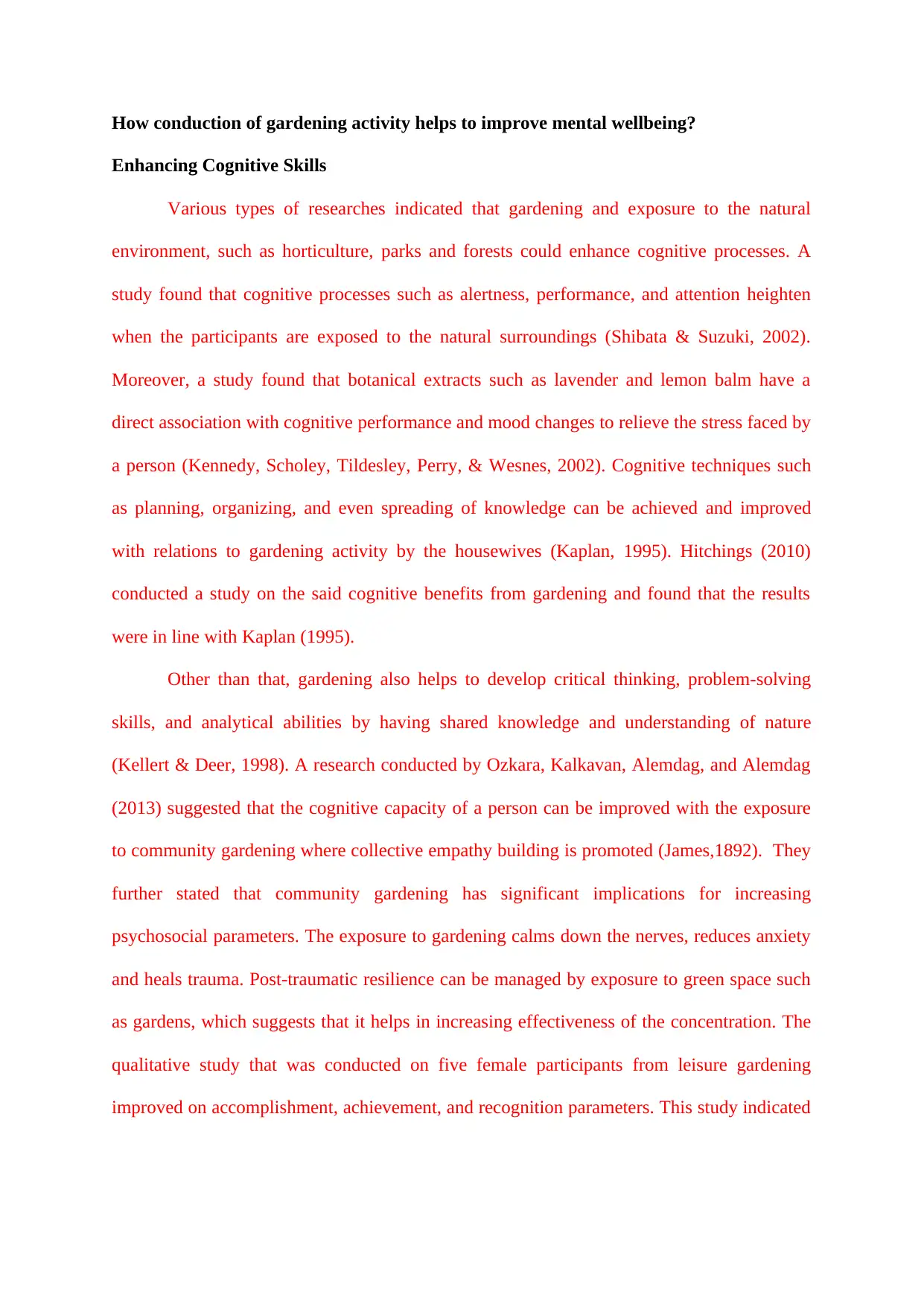
How conduction of gardening activity helps to improve mental wellbeing?
Enhancing Cognitive Skills
Various types of researches indicated that gardening and exposure to the natural
environment, such as horticulture, parks and forests could enhance cognitive processes. A
study found that cognitive processes such as alertness, performance, and attention heighten
when the participants are exposed to the natural surroundings (Shibata & Suzuki, 2002).
Moreover, a study found that botanical extracts such as lavender and lemon balm have a
direct association with cognitive performance and mood changes to relieve the stress faced by
a person (Kennedy, Scholey, Tildesley, Perry, & Wesnes, 2002). Cognitive techniques such
as planning, organizing, and even spreading of knowledge can be achieved and improved
with relations to gardening activity by the housewives (Kaplan, 1995). Hitchings (2010)
conducted a study on the said cognitive benefits from gardening and found that the results
were in line with Kaplan (1995).
Other than that, gardening also helps to develop critical thinking, problem-solving
skills, and analytical abilities by having shared knowledge and understanding of nature
(Kellert & Deer, 1998). A research conducted by Ozkara, Kalkavan, Alemdag, and Alemdag
(2013) suggested that the cognitive capacity of a person can be improved with the exposure
to community gardening where collective empathy building is promoted (James,1892). They
further stated that community gardening has significant implications for increasing
psychosocial parameters. The exposure to gardening calms down the nerves, reduces anxiety
and heals trauma. Post-traumatic resilience can be managed by exposure to green space such
as gardens, which suggests that it helps in increasing effectiveness of the concentration. The
qualitative study that was conducted on five female participants from leisure gardening
improved on accomplishment, achievement, and recognition parameters. This study indicated
Enhancing Cognitive Skills
Various types of researches indicated that gardening and exposure to the natural
environment, such as horticulture, parks and forests could enhance cognitive processes. A
study found that cognitive processes such as alertness, performance, and attention heighten
when the participants are exposed to the natural surroundings (Shibata & Suzuki, 2002).
Moreover, a study found that botanical extracts such as lavender and lemon balm have a
direct association with cognitive performance and mood changes to relieve the stress faced by
a person (Kennedy, Scholey, Tildesley, Perry, & Wesnes, 2002). Cognitive techniques such
as planning, organizing, and even spreading of knowledge can be achieved and improved
with relations to gardening activity by the housewives (Kaplan, 1995). Hitchings (2010)
conducted a study on the said cognitive benefits from gardening and found that the results
were in line with Kaplan (1995).
Other than that, gardening also helps to develop critical thinking, problem-solving
skills, and analytical abilities by having shared knowledge and understanding of nature
(Kellert & Deer, 1998). A research conducted by Ozkara, Kalkavan, Alemdag, and Alemdag
(2013) suggested that the cognitive capacity of a person can be improved with the exposure
to community gardening where collective empathy building is promoted (James,1892). They
further stated that community gardening has significant implications for increasing
psychosocial parameters. The exposure to gardening calms down the nerves, reduces anxiety
and heals trauma. Post-traumatic resilience can be managed by exposure to green space such
as gardens, which suggests that it helps in increasing effectiveness of the concentration. The
qualitative study that was conducted on five female participants from leisure gardening
improved on accomplishment, achievement, and recognition parameters. This study indicated
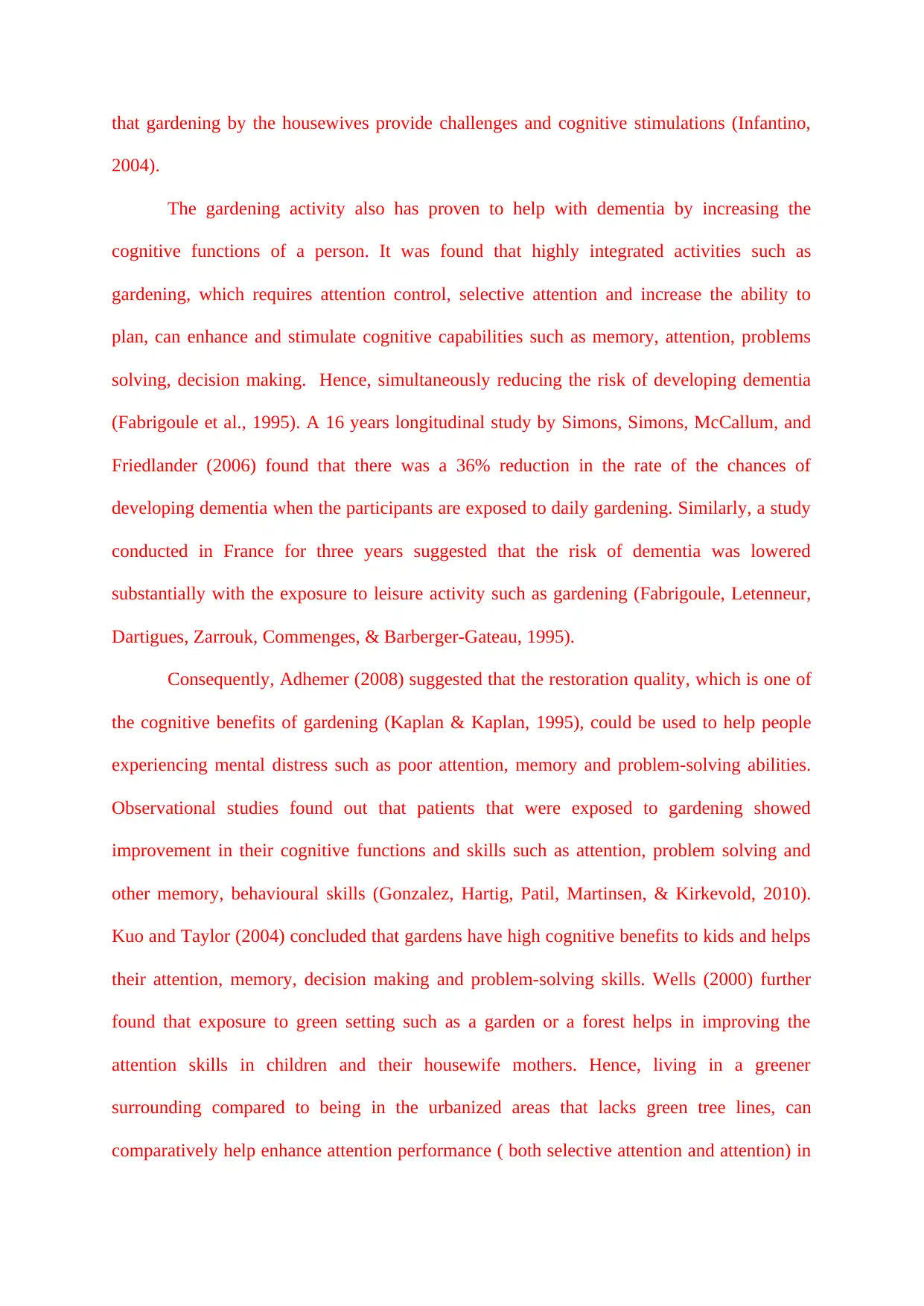
that gardening by the housewives provide challenges and cognitive stimulations (Infantino,
2004).
The gardening activity also has proven to help with dementia by increasing the
cognitive functions of a person. It was found that highly integrated activities such as
gardening, which requires attention control, selective attention and increase the ability to
plan, can enhance and stimulate cognitive capabilities such as memory, attention, problems
solving, decision making. Hence, simultaneously reducing the risk of developing dementia
(Fabrigoule et al., 1995). A 16 years longitudinal study by Simons, Simons, McCallum, and
Friedlander (2006) found that there was a 36% reduction in the rate of the chances of
developing dementia when the participants are exposed to daily gardening. Similarly, a study
conducted in France for three years suggested that the risk of dementia was lowered
substantially with the exposure to leisure activity such as gardening (Fabrigoule, Letenneur,
Dartigues, Zarrouk, Commenges, & Barberger-Gateau, 1995).
Consequently, Adhemer (2008) suggested that the restoration quality, which is one of
the cognitive benefits of gardening (Kaplan & Kaplan, 1995), could be used to help people
experiencing mental distress such as poor attention, memory and problem-solving abilities.
Observational studies found out that patients that were exposed to gardening showed
improvement in their cognitive functions and skills such as attention, problem solving and
other memory, behavioural skills (Gonzalez, Hartig, Patil, Martinsen, & Kirkevold, 2010).
Kuo and Taylor (2004) concluded that gardens have high cognitive benefits to kids and helps
their attention, memory, decision making and problem-solving skills. Wells (2000) further
found that exposure to green setting such as a garden or a forest helps in improving the
attention skills in children and their housewife mothers. Hence, living in a greener
surrounding compared to being in the urbanized areas that lacks green tree lines, can
comparatively help enhance attention performance ( both selective attention and attention) in
2004).
The gardening activity also has proven to help with dementia by increasing the
cognitive functions of a person. It was found that highly integrated activities such as
gardening, which requires attention control, selective attention and increase the ability to
plan, can enhance and stimulate cognitive capabilities such as memory, attention, problems
solving, decision making. Hence, simultaneously reducing the risk of developing dementia
(Fabrigoule et al., 1995). A 16 years longitudinal study by Simons, Simons, McCallum, and
Friedlander (2006) found that there was a 36% reduction in the rate of the chances of
developing dementia when the participants are exposed to daily gardening. Similarly, a study
conducted in France for three years suggested that the risk of dementia was lowered
substantially with the exposure to leisure activity such as gardening (Fabrigoule, Letenneur,
Dartigues, Zarrouk, Commenges, & Barberger-Gateau, 1995).
Consequently, Adhemer (2008) suggested that the restoration quality, which is one of
the cognitive benefits of gardening (Kaplan & Kaplan, 1995), could be used to help people
experiencing mental distress such as poor attention, memory and problem-solving abilities.
Observational studies found out that patients that were exposed to gardening showed
improvement in their cognitive functions and skills such as attention, problem solving and
other memory, behavioural skills (Gonzalez, Hartig, Patil, Martinsen, & Kirkevold, 2010).
Kuo and Taylor (2004) concluded that gardens have high cognitive benefits to kids and helps
their attention, memory, decision making and problem-solving skills. Wells (2000) further
found that exposure to green setting such as a garden or a forest helps in improving the
attention skills in children and their housewife mothers. Hence, living in a greener
surrounding compared to being in the urbanized areas that lacks green tree lines, can
comparatively help enhance attention performance ( both selective attention and attention) in
⊘ This is a preview!⊘
Do you want full access?
Subscribe today to unlock all pages.

Trusted by 1+ million students worldwide
1 out of 48
Related Documents
Your All-in-One AI-Powered Toolkit for Academic Success.
+13062052269
info@desklib.com
Available 24*7 on WhatsApp / Email
![[object Object]](/_next/static/media/star-bottom.7253800d.svg)
Unlock your academic potential
Copyright © 2020–2026 A2Z Services. All Rights Reserved. Developed and managed by ZUCOL.





